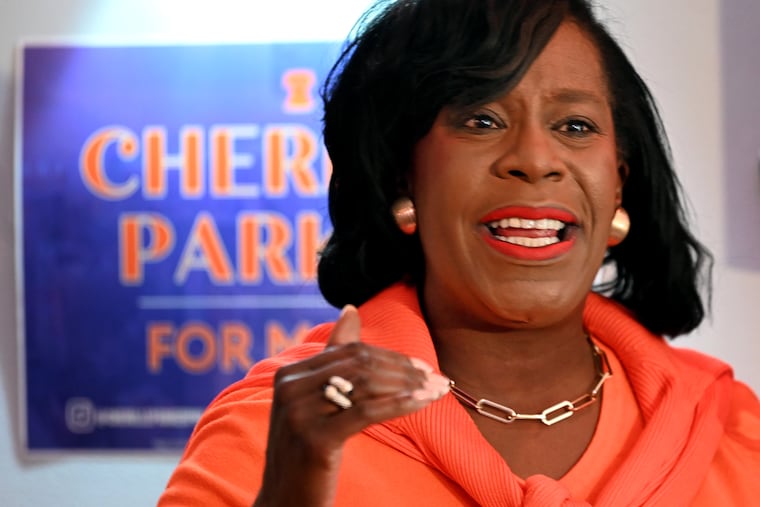How Cherelle Parker would focus on SEPTA crime as mayor
Parker has experience in the state legislature and City Council. Advocates for transit improvements say that background will be helpful to the regional transit agency.

Philadelphia’s transit system and its present and oncoming problems got little public airing in the Democratic mayoral primary, but nominee Cherelle Parker did indicate in candidate questionnaires and on the campaign trail that public safety would be her priority for SEPTA.
Parker, a former member of City Council and the state legislature, wants a bigger law enforcement presence, with Philadelphia police officers patrolling near subway stations and transit centers in coordination with the Transit Police, according to her answers in a candidate questionnaire by SEPTA’s Citizen Advisory Committee.
“Safety on public transit is paramount,” Parker said.
She faces Republican David Oh, a former City Council colleague, in the general election. As a lawmaker, he also expressed concerns about public safety on SEPTA and often prodded the agency to be more aggressive fighting crime and disorder.
Because of Philadelphia’s voting history and Democrats’ overwhelming edge in voter registration, Parker is considered the odds-on favorite to be elected the 100th mayor of the city in November.
Public transportation advocates were disappointed that mobility issues did not get a thorough campaign discussion, but said in interviews that they were optimistic that Parker would likely benefit SEPTA because she knows how Harrisburg and City Hall work — and has a reputation for building coalitions.
Of course, mayors don’t have operational power over SEPTA, a regional authority created by the state, but they can have influence if engaged, advocates said.
And the city does control some things with a direct impact on SEPTA’s potential for success, including its ongoing bus route overhaul, dubbed the “Bus Revolution.” For instance, Connor Descheemaker, coalitions manager with Transit Forward Philadelphia, said the city controls bus shelters, the establishment of rapid-bus-transit lanes and other infrastructure.
“SEPTA’s been doing a lot with cleaning and safety but it’s such a tall order that, if the city could help with its own resources and funding, that would be big,” said Mason Carter, chair of the SEPTA Citizen Advisory Committee, a group appointed by the city and county governments to represent riders.
Parker’s plan: More police, expanded service
During a televised debate on PHL17 in April, Parker spoke of how the region’s economy depends on SEPTA as she endorsed a proposal to extend the Broad Street Line along Roosevelt Boulevard to Bucks County.
“People are really shocked to learn that there is something called the reverse commute phenom taking place,“ Parker said on the broadcast. “Folks are not simply coming to Philadelphia for employment but our residents are traveling to the five counties for opportunities.”
To advocate Descheemaker that answer showcased that Parker has a vision about expanding SEPTA, instead of managing its decline.
“We’re hoping to continue to hear candidate Parker talk about going beyond a scarcity mindset,” Descheemaker said. Further, he explained, investing in improvements to the transit system will take support from the city, its counties in the SEPTA service area and the state.
They said Parker is well positioned to bring the relevant parties together and make progress. “We can’t just say, ‘SEPTA sucks’ and go on our way.”
SEPTA faces a fiscal crisis soon, with the federal pandemic aid that has kept it afloat projected to run out next April. Agency officials say they’ll have a $240 million shortfall in their budget. Currently, legislation is pending in Harrisburg that would enable counties and the city to establish a special local tax to help stabilize SEPTA finances.
Jay Arzu, the doctoral urban planning student who has been the leading proponent of the Roosevelt Boulevard subway idea, was cheered by Parker’s support for the project. He also said that her focus on law and order has promise.
“That may be the tough love SEPTA needs ... to help with its crime perception problem,” Arzu said.
Asked what the mayor could do to improve communication between the school district and SEPTA and how to address “unruly kids” riding transit after dismissal, Parker also stressed law and order.
“The abundance of unruly riders simply stem[s] from a lack of law enforcement presence,” she said. “My strategy is that with more presence, we will see a reduction in crimes or negative behavior.”
David Oh’s vision for SEPTA
Oh, the Republican nominee for mayor, has been a vocal critic of SEPTA’s handling of crime and disorder for the last two years. After several violent attacks on the subways in 2021, he successfully pushed for a joint Council committee hearing on the issue.
Oh also proposed withholding $10 million from the city’s annual contribution to SEPTA in 2022, unless it increased pay for Transit Police officers and committed to hiring more of them. At the time, SEPTA and the Fraternal Order of Transit Police announced an agreement to sharply increase officer salaries. Oh withdrew his amendment.
SEPTA officials say recruiting was boosted by the pay increase; a police academy class of 21 recruits is set to graduate on June 9 and become transit officers.
Oh said in the PHL17 debate that he liked the concept of the Roosevelt Boulevard subway, but that “the reality of how you’re going to do it needs to be front and center.”
This story has been edited to correct Connor Descheemaker’s preferred pronoun and job title.